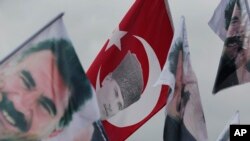As Turkey faces its second parliamentary election in five months, the country's Kurdish minority has once again become central to the vote. The pro-Kurdish HDP party won seats in parliament for the first time in June, depriving the ruling AK party of a majority. After hopes that a cease-fire deal between the government and PKK Kurdish separatists in the east would finally bring peace, fighting erupted again over the summer.
In eastern Turkey's remote Erzurum province, a majority Kurdish area that is religious, conservative and one of they country's poorest, there are growing tensions amid the rural life. PKK fighters killed two soldiers there earlier this month. Dozens of suspected militants have also been arrested.
VOA joined a gathering of men in Eyiba village, which is reached by a dirt track winding into the mountains. The discussion made it clear that politics is not a comfortable subject among the residents.
"We don't know who we will vote for yet," said Abdullilah Colak. "Last time we voted for the Kurdish party HDP, but what happened was completely opposite of what we wanted — the fighting started again. So now we are thinking very deeply. We are stuck in the middle."
Political conundrum
President Recep Tayyip Erdogan called for the November 1 vote after the AKP lost its majority for the first time since 2002 and two months of talks with the opposition on forming a ruling coalition proved unsuccessful.
"The AK party did good things for the country, but our Kurdish party has never been in government," said Zulkif Gezer, another resident of Eyiba. "We need to give them a chance."
Two government-appointed teachers from the village school — both ethnic Turks, not Kurds — joined the gathering and many villagers became reluctant to talk.
"We will vote for the party that serves the people," said elderly resident Abdulmelik Dundar. "We are happy with our government and we will vote for the AK party. If other countries don't try to make trouble in Turkey, we don't have a problem with each other here."
Remote yet connected
Some of the village's houses are little more than stone huts heated by burning cow or sheep dung, which is piled outside ready for the bitter winter ahead when Eyiba is often completely cut off from other areas. But some residents say the AK party has improved their everyday life.
"Now we have an air ambulance helicopter," said Kasim Tutar. "Before when we went to the doctor we had to spend 200 or 300 liras [$70 to $100], but now we don't pay. And if I go to Istanbul to work, no one bothers me anymore for being a Kurd. The situation for Kurds has improved."
In Turkey's remote Kurdish communities, the hope for peace is once more being replaced by the fear of conflict.




